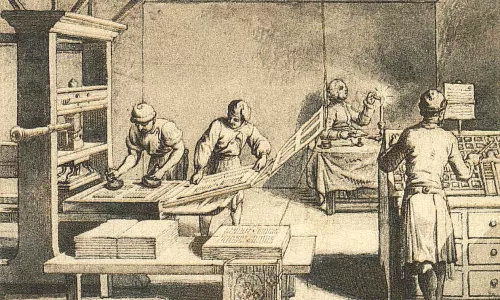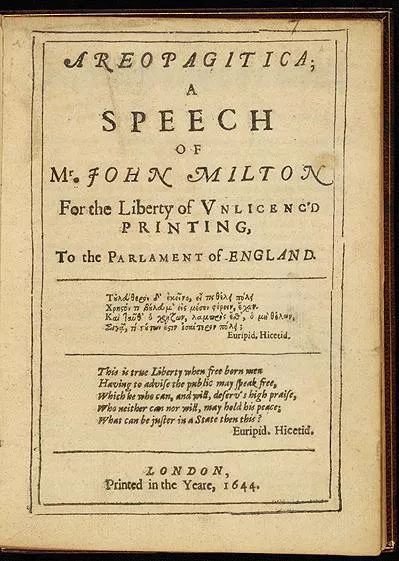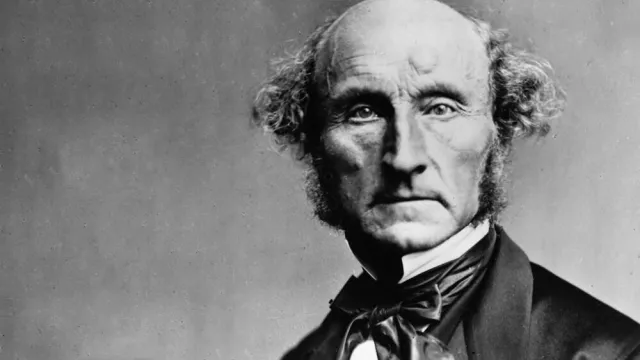Table of Contents
Why John Milton’s free speech pamphlet ‘Areopagitica’ still matters
Research & Learn
Milton’s reasoning against pre-publication censorship remains powerful and persuasive nearly 400 years later.
By Nick Clairmont

Last updated: 6/18/2024
Renowned English author and revolutionary John Milton is most famous for writing the epic poem “Paradise Lost” — the Genesis story aimed at “justifying the ways of God to men.” But if you’re a fan of free speech, Milton’s most important work for you may be “Areopagitica,” a short polemical pamphlet he wrote 23 years earlier, which argued “For the Liberty of unlicensed printing.”
Written in 1644, “Areopagitica” was a work of its own tumultuous political moment. The British Parliament had just overthrown and beheaded the king of England, Charles I. They judged him tyrannical for, among other things, refusing to let Parliament check his power over English governance. Adding to this, fights over religious truth — and related fights over the proper role of the church in government and daily life — simmered across Europe since Johann Gutenburg invented the printing press. The resulting proliferation of printed media — broadsides, pamphlets, books — allowed people to read on a scale that simply hadn’t been economically or technically possible.

A renowned poet from a young age, Milton shifted gears during the middle of his career, turning his pen toward political pamphleteering and arguing over the structure of government and religion. In “Areopagitica,” written at 36, he presented a plea to his own faction: the forces that had overthrown Charles I and now wanted to change the law so that all books published must be “licensed” first by the government.
Milton argued that Parliament was acting like the tyrant king they’d just overthrown, and aimed to persuade its members that they made a grave error against their own best natures — and against reason itself.
So what does Milton say in this work? How did it come to be understood as one of the foundations of our modern understanding of free expression? In this explainer, we’ll examine Milton’s free speech arguments in “Areopagitica,” his contradictory advocacy for post-publication censorship, and why his advocacy and reasoning still (mostly) matter today.
Milton’s arguments for free expression
Milton designed “Areopagitica” as both a polemic aimed at persuading specific people and a general exploration of the issues around freedom of the press. In it, Milton makes several separate but parallel points, and tries to argue not merely by his own reasoning but also by the reasoning of the people he is trying to persuade.
For example, the title, “Areopagitica,” is an allusion to the Areopagus — the hill in Athens named for the god Ares. As Milton’s audiences at the time would have understood from their schooling on classical antiquity, it was on this hill that there once stood a court that handled important public business. This included the business of censorship, similar to what the British Parliament of Milton’s time had recently legislated.
The difference, however, was that ancient Greek pre-publication censorship was actually much less onerous than what England was now doing, and Milton made that point clear in “Areopagitica.” He also described how in ancient Rome at the time of Cicero or Catullus — poets and politicians Milton knew members of Parliament venerated — censorship was less stringent than Parliament’s current licensing law demanded.

John Stuart Mill’s enduring arguments for free speech
Nearly two centuries after writing ‘On Liberty’, Mill remains one of the forefathers of free expression. Here’s why.
Flattering the good taste of members of Parliament, Milton rattles off references to famously irreverent and edgy schools of philosophy that were nonetheless tolerated by the censors of the time. In ancient Athens, he points out, “we do not read that either Epicurus, or that libertine school of Cyrene, or what the Cynic impudence uttered, was ever questioned by the laws.” Milton also notes that in ancient Rome, the censors were relatively permissive too. And it is only because of this permissiveness that these philosophical treasures could be known and appreciated by the people of Milton’s time.
To drive it home — and to further scandalize his intended audience — Milton emphasizes that the rules imposed by Parliament’s licensing law are similar to the dreaded index of banned works upheld by the Roman Catholic Church. Given that the Church was the enemy of liberty-loving Protestant England, Milton’s comparison seemed to ask by implication: Did these modern Englishmen really want to be like the Catholics? Does all their licensing make their societies better, with less trouble?
As he puts it: “If the amendment of manners be aimed at, look into Italy and Spain, whether those places be one scruple the better, the honester, the wiser, the chaster, since all the inquisitional rigor that hath been executed upon books.”
According to Milton, the licensing law was downright un-English — which, to Englishmen of the time, was a scathing criticism.
Milton’s contradictory beliefs about book bans
Throughout “Areopagitica,” Milton repeatedly draws the distinction between what he called “licensing,” or pre-publication censorship, and “censorship,” which occurs after a book has already been printed and distributed. It is the former that he rails against in “Areopagitica.” The latter was something Milton didn’t have much disagreement with. In fact, Milton would later become the Secretary for Foreign Tongues for the government — a job which included actually doing state censorship.
A few years after writing Areopagitica, Milton would serve as the censor for the Mercurius Politicus, a proto-newspaper aligned with Parliament and published until the beheaded king’s son was restored to the throne in 1660.
It gets worse, too. By 1649, Milton’s role in government even involved the pre-publication censorship of books — the very thing he previously argued against in “Areopagitica”!
This is an intellectual twist that makes Milton a much more complex historical icon in the history of free speech, and there are competing opinions on what to conclude from Milton’s contradictions. Some Milton scholars argue that in his government position he actually undermined censorship by doing his job poorly — though records make that hard to prove.
Books are not absolutely dead things, but do contain a potency of life in them to be as active as that soul was whose progeny they are
Others, of course, put it down to something much simpler: the human capacity for hypocrisy. FIRE senior fellow Jacob Mchangama, author of “Free Speech: A History from Socrates to Social Media,” even coined a term for Milton’s supposed fickleness on censorship: “Milton’s Curse,” defined as the tendency for advocates against censorship to be selective about how they apply their free speech principles.
Nonetheless, even if Milton’s actual actions do not live up to the free speech principles we might like today, he must still be understood as having contributed a great deal to pro-free speech discourse. He took an early stand in articulating the ideas behind why censorship was an offense to freedom and reason — and he did so in works that commanded tremendous influence, both in his own time and in our own.
That influence comes down to what nobody can knock Milton for: The sheer force and quality of his writing. For instance, his discussion of the value of books plucks at the heartstrings in a way that might leave even the most enthusiastic book-banner queasy:
Books are not absolutely dead things, but do contain a potency of life in them to be as active as that soul was whose progeny they are; nay they do preserve as in a vial the purest efficacy and extraction of that living intellect that bred them. I know they are as lively, and as vigorously productive, as those fabulous Dragons teeth; and being sewn up and down, may spring up armed men. And yet on the other hand, unless wariness be used, as good almost kill a Man as kill a good Book; who kills a man kills a reasonable creature, God’s Image; but he who destroys a good Book, kills reason itself, kills the Image of God, as it were in the eye.
Perhaps most importantly, Milton’s appeal to the reader is grounded on one fundamental thing: his immovable belief in individual reason.
Milton as a proponent of reason
In what is perhaps the most radical argument in “Areopagitica,” Milton argues that by banning books before they have a chance to circulate, the state attempts to tell people what to think. As a result, the people can’t really think at all.
“A man may be a heretic in the truth,” he writes “and if he believes things only because his Pastor says so, or the Assembly so determines, without knowing other reason.”
Milton believed that without actually hearing out the arguments in question, neither a person nor society can figure out what they truly believe. If they merely believe what they are told without considering the alternatives deeply, then they don’t truly believe it.
And though all the winds of doctrine were let loose to play upon the earth, so Truth be in the field, we do injuriously, by licensing and prohibiting to misdoubt her strength.
So, he argues, Parliament — and the readers of his pamphlet — should trust their own convictions. They should have confidence that their arguments can win out even when people can read and hear opposing viewpoints. Or as Milton put it:
I cannot praise a fugitive and cloistered virtue, unexercised and unbreathed, that never sallies out and sees her adversary, but slinks out of the race, where that immortall garland is to be run for, not without dust and heat. Assuredly we bring not innocence into the world, we bring impurity much rather: that which purifies us is trial, and trial is by what is contrary.
Here, among all the arguments against the licensing law Milton wanted repealed, we have the very essence of his general argument for a free press: Trust people, you chickens.

Without allowing people to consider potentially wicked ideas, untruths, and whatever else is out there, they will never figure out for themselves what ideas are deserving of merit in the first place. A system of pre-publication censorship only makes sense if we already have all the answers — and we don’t. Never have. Never will. Since finding the answers is a never-ending process, we should not designate it to the state, a cleric, or any expert class. The best we can do is to circulate ideas and texts and fight it out amongst ourselves.
Or as Milton put it nearly 275 years before Justice Oliver Wendell Holmes Jr. coined the “marketplace of ideas” argument for free speech:
And though all the winds of doctrine were let loose to play upon the earth, so Truth be in the field, we do injuriously, by licensing and prohibiting to misdoubt her strength. Let her and Falsehood grapple; who ever knew Truth put to the worse, in a free and open encounter. Her confuting is the best and surest suppressing.
Of course, even Milton seemed incapable of trusting people very much. After all, it is not difficult to see Milton’s reasoning against pre-publication censorship applying just as well to censorship after the fact — which is why his logical dissonance is so difficult to reconcile.
Regardless, the arguments transcend the man, and their impact reverberates in free speech discourse to this day.
Why ‘Areopagitica’ still matters
Areopagitica is not just a historical curiosity — something a college course on the history of English literature or political thought might include. It is so much more than that. It is one of the foundational documents of the Enlightenment and, more broadly, western liberalism, and it has endured as such for nearly 400 years.
No doubt if FIRE existed in 1644 England, we would have supported Milton’s view that the 1643 licensing law ought to be repealed. We would also have repudiated his advocacy for post-publication censorship. It’s no different to FIRE’s approach today, where many public figures and politicians are inconsistent, at best, when it comes to free speech. Milton was an imperfect advocate, but without “Areopagitica,” there may never have been an intellectual tradition of free speech to uphold today. At the very least, without Milton that tradition would be a much poorer one.
Ultimately, the reason why lovers of free expression ought to care about “Areopagitica” is deeper and more general than any one law or any one writer. It’s that for hundreds of years, societies have faced crises of trust framed as crises of truth. In his famous pamphlet, Milton was the strongest advocate — and one of the earliest — for the position that when questions about what is true and what is valuable arise, the least imperfect final authority is the individual’s own conscience and reason.